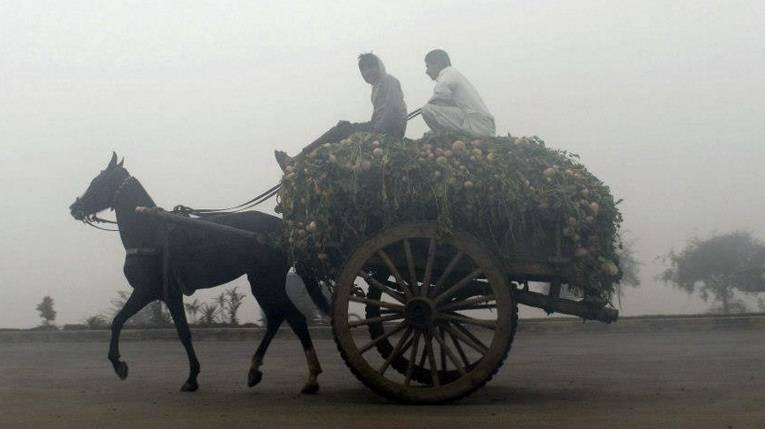Heigh ho, a hiatus! As we return to normal scheduling, we wait also for the weather to turn. And we wait, and wait, and wait. December has begun with no need to wear more than one extra layer, turn on a heater or dread getting out of your warm bed in the morning. After the days of tremendously frightening, almost Biblical smog, the sky has cleared to mostly haze. We are deep in the grip of environmental disaster, and anyone who tells you the smog was because of Diwali is a halfwit whom you must never speak to ever again. The disastrous smog was most certainly not some kind of toxic enemy cloud wafted across the border, where they celebrate Diwali and Dussehra (another holiday involving the burning of things) every year with no effect on us whatsoever. It’s because in the past year Lahore has been laid waste to by the Punjab government as it cussedly continues to ravage our city with its pestiferous Orange Train. You and I, gentle reader, might be somewhat shielded from the reality of the inner city, but just because we can’t see it doesn’t mean it’s not happening. The city is a dug-up dengue trap, with piles of dirt heaving dust into the air, pits for pylons becoming sinkholes and traffic congestion on the few usable roads skyrocketing. Add to this the vicious and relentless cutting of trees—the only things keeping the pollution somewhat at bay—and you have a recipe for utter, mad disaster.
It’s not a liberal hand-wringing agenda at work. Anyone with two eyes to see knows this: Lahore in in urgent peril, the entire country is, the entire planet is. Donald Trump wants to give coal-miners their jobs back, but those miners lost their jobs because coal is the worst kind of fuel for anything. India has built several coal-burning factories near the border, apparently we thought we could one-up them and set up a bunch too. Burning coal releases tons of carbon monoxide into the air, essentially poison. Cigarettes produce carbon monoxide; one puff incapacitates the cilia in your nose and lungs for up to twenty minutes (cilia are tiny waving hairs that keep inhaled bacteria and dirt out of your body). So for those twenty minutes, all kinds of nasty stuff will down straight into your lungs, because the tiny objects preventing this from happening have been knocked out. In the meantime, carbon monoxide rockets into you bloodstream, where it takes the place of oxygen in your blood (red blood cells bond or stick together with oxygen molecules. Carbon monoxide molecules are like cuckoos in that nest, because their shape is a lot like oxygen), which means all your organs are getting less oxygen. Now take this one cigarette and multiply it by several million, and that’s an approximation of how much damage is being caused by coal to the air we breathe.
When scientists and environmentalists speak of the environment we tend not to listen, because we don’t want to understand the importance of what they are saying. We have water in our taps, we aren’t living next to a landfill, nobody we know is dying of respiratory disease. Maybe all this talk is just exaggeration—only it isn’t. Putting one’s head in the sand like that is ridiculously inexcusable. One might feel like it isn’t your problem, but it is. We are all responsible for this planet, and we are racing towards its destruction. There will be no potable water, the air will be toxic to breathe, the soil too polluted to grow any crops in. This is not a hysterical scene from a dystopian novel, this is what science is telling us, more and more urgently. This is what we are turning our home into, and it is a slow, creeping process but it is becoming irrevocable.
You might not be able to do much about the factories pumping pollutants into the oceans, or the fact that the Great Barrier Reef in Australia is officially dead (which is catastrophic, by the way, for marine life). But you can make sure that the taps in your house aren’t leaking. That you turn off the water when you’re brushing your teeth, or take balti baths instead of showers. You can switch cars to electric ones, or at least make sure you aren’t using diesel and your car is in good shape so its emissions are lower. You can recycle as much as possible and use cloth bags or a plastic chabba when you go shopping, so that you are minimising your use of plastic. Make a compost heap, even if it’s a tiny one, to recycle biodegradable kitchen scraps. Start carpooling with neighbours for the school run, so that there’s one less car on the road. Eat less meat—processing cattle for meat supply uses up incredible amounts of water. It’s not as hard as it sounds, and I promise that you will be making a difference. You might not think it, but you are. Look outside the window at the haze, and look at the children around you. We already live in such mean, dangerous times. They are already surrounded by threats and terrors we could never imagine at their age. Do they now deserve to inherit a wasteland of a planet from us as well? A devastated, denuded city full of garbage on the ground, toxic fumes in the air and poison in the water? Is nothing safe for them? We stand at a critical juncture, a most urgent and serious call to action. Can we get over ourselves and see the larger picture, or will we just take, take, take and give nothing back, leave nothing behind for them to inherit?






